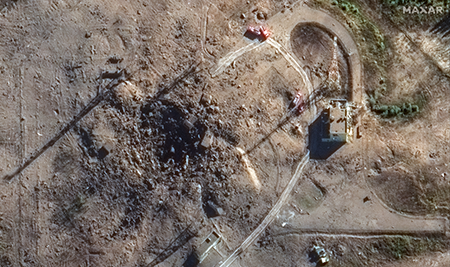"The Arms Control Association’s work is an important resource to legislators and policymakers when contemplating a new policy direction or decision."
Sarmat Failure Casts Doubt on Russian Heavy ICBM
November 2024
By Doniyor Mutalov
A Russian RS-28 Sarmat heavy intercontinental ballistic missile (ICBM) exploded in September at its test launch site, marking another setback for a missile that Russian authorities claim is already on active combat duty.

Unlike a previous test failure in February 2023, which was confirmed by U.S. officials, the latest mishap was visible to open-source analysts. Satellite images, taken Sept. 21 by Planet Labs and shared by analysts on social media and later corroborated by images published by Reuters from Maxar Technologies, demonstrated that a Sarmat test silo at the Plesetsk Cosmodrome was destroyed completely either during the missile test or after the test’s cancellation.
Military analysts quoted by Reuters said that it was not possible to identify the mode of failure.
This marked, at the very least, the second confirmed test failure for the Sarmat, and it cast doubt on the reliability of a critical component of Russia’s nuclear modernization program.
The Russian Defense Ministry did not acknowledge the incident and has made no announcements about Sarmat tests since April 2022, when the first and only successful test was conducted.
President Vladimir Putin unveiled the Sarmat ICBM as one of three next-generation missiles in his 2018 speech to the Russian Federal Assembly. Despite its poor testing record, Sarmat has been fast-tracked into the Russian strategic forces. Yuriy Borisov, the head of the state space corporation Roscosmos, told RIA Novosti on Sept. 1, 2023, that the Sarmat had been deployed for “combat duty.” A month later, Putin said at the Valdai International Discussion Club that only “administrative and bureaucratic procedures” needed to be completed before the missile moved to mass production.
In his February 2024 comments before the Federal Assembly, Putin said that the first “serially produced” Sarmat ICBMs had been delivered and promised to “show them to you on their combat alert duty in the areas of their deployment.”
The last heavy ICBM produced by the Soviet Union, the Voevoda R-36M2, was tested successfully 20 times before deployment, according to the website of the Russian Defense Ministry.
Heavy ICBMs were defined by the second round of U.S.-Soviet Strategic Arms Limitation Talks as ICBMs with a greater throw-weight or launch-weight than any light ICBM then in service. The 1979 agreement from those talks, which never entered into force, explicitly identified earlier versions of the R-36M missile as heavy ICBMs. The Sarmat could be armed with up to 10 multiple independently targetable reentry vehicles, according to the Federation of American Scientists.
Russian nuclear policy expert Nikolai Sokov told Reuters on Sept. 24 that Moscow will persist with the Sarmat program because the Russian military would like to preserve competition between the two rival Russian ICBM design plants.
